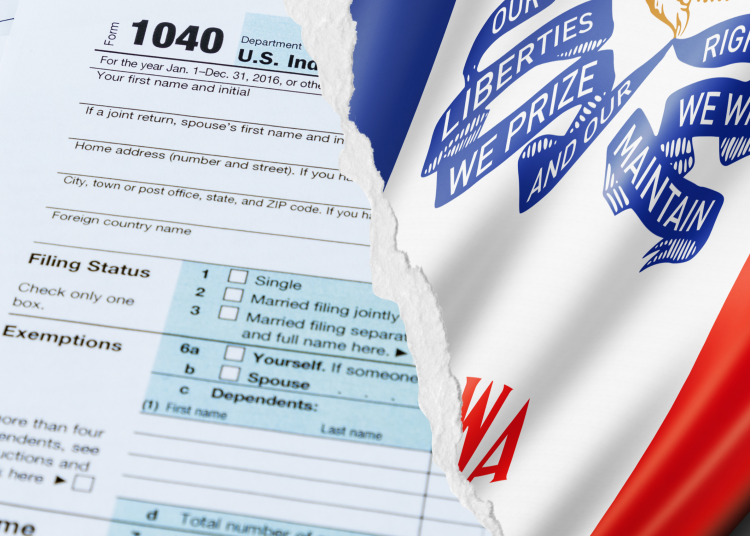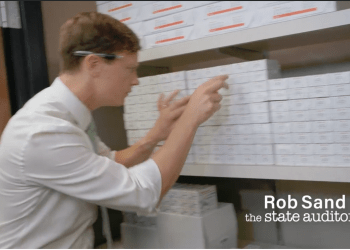This year Iowa’s top corporate tax rate decreased from 12 percent, the highest in the nation, to 9.8 percent. Even at 9.8 percent, Iowa’s corporate tax rate is high. Many states have or are in the process of gradually lowering their corporate income tax rates. Nebraska recently passed legislation to reduce their corporate tax from 7.81 percent to 6.84 percent. For Iowa to remain economically competitive, it must continue to lower tax rates.
Lowering the corporate tax is often viewed negatively as it is assumed only to benefit large corporations. This is hardly the case, and a consequence of high corporate tax rates is that the cost is passed onto consumers. Taxes on income, including individual and corporate income taxes, are considered the most harmful taxes.
“Taxing corporate income has always been a convoluted, unfair, and inefficient way to raise government revenue. Don’t be fooled by the label. A “corporation” is simply a bundle of contracts among individuals — investors, lenders, executives, workers, vendors, and consumers. Only people pay taxes. Legal abstractions can’t,” wrote John Hood, Chairman of the John Locke Foundation.
Economists from Ohio’s Buckeye Institute argue that corporate taxes are economically damaging because they “discourage business productivity by reducing the benefits of hiring workers or investing in infrastructure.” In addition, corporate income taxes “syphon resources away from productive investments and increase the cost of doing business.” Both business and labor are essential for economic growth and a high corporate tax rate discourages both.
“Compared to other major taxes, the corporate income tax is one of the most economically harmful taxes states levy, because while corporations are legally responsible for paying the tax, the economic incidence of the corporate income tax falls on a firm’s shareholders, employees, and consumers in the form of lower investment returns, lower wages, and higher prices,” wrote Katherine Loughead, a Senior Analyst with the Tax Foundation. Loughead noted that high corporate tax rates create a “sticker shock,” which can deter economic growth and investment.
North Carolina is a state tax reform leader and is considered the “Gold Standard” example for states to follow. North Carolina has the nation’s lowest corporate tax rate at 2.5 percent. Currently, the legislature in North Carolina is considering a tax reform plan that would phase out the corporate tax rate.
“North Carolina has been steadily reducing its corporate tax rate for nearly a decade now. At 2.5%, it has the lowest rate of any state that taxes corporate income. Phasing it out entirely over the next few years will generate economic benefits far greater than the apparent fiscal cost. We’ll attract more investment, creating more jobs at higher wages. And, yes, consumers will pay lower prices,” wrote Hood.
Governor Kim Reynolds recently signed a tax reform measure passed by the Iowa legislature. One provision of this new law repealed the 2018 income tax revenue triggers, which will ensure that the top individual income tax rate will now fall to 6.5 percent. It should be noted that this year’s lowering of the corporate income tax rate results from the 2018 tax reform law.
During the signing ceremony for the tax reform law, Governor Reynolds stated that tax reform is far from over in Iowa. Iowa’s economy continues to recover, and revenue growth remains positive. Iowa’s fiscal house is in sound order with full reserves and a projected $500 million surplus. Policymakers should continue to work to advance both lower corporate and individual tax rates.
To lower tax rates, what do policymakers need to take into consideration? The following factors are not an exhaustive list, but perhaps the most important to take into consideration:
- Taxes and spending are the same side of the coin: Since states must balance their budgets, any tax reform, including revenue-neutral, must take into consideration the impact regarding revenues. If lower rates are the objective, then policymakers need to be prepared to prioritize spending. Controlling spending is a vital part of tax reform. “Pro-growth tax relief can be trusted to make states more competitive, but it takes time to develop and must be offset with appropriate spending reforms,” stated Jonathan Williams. It is also important to remember that pro-growth tax reform will result in economic growth, which means more revenue, but the growth may not be immediate. This also depends on the structure of the tax reform.
- Revenue triggers can be an effective policy tool: Several states have utilized revenue triggers as a tool to help lower tax rates. Revenue triggers, if designed correctly, can help states lower tax rates while providing protection for the state budget. North Carolina is an example of a state that utilized triggers effectively to lower tax rates. In 2018, Iowa utilized a revenue trigger in order to lower individual income tax rates. Still, one mistake was tying the triggers to a specific year and requiring a high four percent growth target, whereas North Carolina specified a revenue target, but not a specific year. States can also utilize a phasedown approach to rate reduction. Indiana is an example of a state that has slowly lowered both individual and corporate income taxes by a certain percentage each year or when specific revenue targets are met.
- Evaluate tax credits, incentives, exemptions, and deductions: Any tax reform, especially a pro-growth rate reduction reform, requires “paying for” those reductions. This means that policymakers should consider reforming tax credits, incentives, exemptions, and deductions. North Carolina’s historic tax reform made numerous changes to lower rates and broaden the tax base. Arkansas repealed the InvestArk tax credit program to lower tax rates. Tax exemptions also create distortions in the tax code.
- Sales Tax Base Broadening: Broadening the sales tax base can create additional revenues that could then be used to lower tax rates or replace lost revenues due to income tax rate reductions. If Iowa broadened the sales tax base and removed some of the largest tax exemptions, it could raise an additional $1.4 billion in revenue.
A policy priority for Governor Reynolds is making Iowa’s economy more competitive and creating more economic growth and opportunity. Iowa is in competition with 49 other states for both jobs and people. A state’s tax climate matters and many states are working to lower rates or even eliminate their respective state income tax.
This is the goal of several governors across the nation. Governor Reynolds argued that “taxpayers win when you’ve got governors that are competing to create an environment that not only helps Iowans and Iowa families keep more of their money, but also to create an environment where businesses want to invest and grow, hire Iowans and really drive the quality of life that we want all Iowans to be able to enjoy.”
Iowa does not want to lose any ground as other states are lowering rates and creating a more competitive tax code.
Tax reform is far from complete in Iowa, and we cannot afford to be complacent. The 2021 tax reform law provides an opening for further income tax rate reductions. Lowering rates will not only allow the taxpayer to keep more of their hard-earned income, but it will also benefit consumers and make Iowa’s economy more competitive by creating opportunity and growth.
















